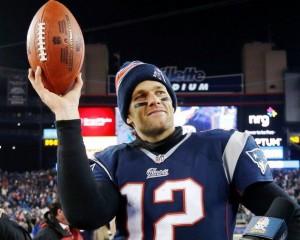The “deflated” football is now part of athletic lore. The proposed solutions – “Everybody uses the same football,” or “Let anyone use the amount of hot air he wants in the dang thing” – are a matter of rules to be defined ever more deftly as problems arise. The issue with NE Patriot QB Tom Brady was not really the appropriateness of his punishment. It was about whether the team and quarterback knew of it, to play unfairly. If they did know but refused to admit it, the affirmations that nothing was wrong were false.
On the assumption of falsity, if the truth simply was admitted, few would have minded much. Most folks would even have admired the honesty of acknowledging that “I manipulated the footballs we used.” But if it was true but not admitted, we have the issue that provoked the sports world. Basically, the integrity of the game was at stake. Compliance with known rules must be expected of players, coaches, owners, referees, and equipment managers.
The “deflated” football is not the most serious aberration ever to confront the sports world. The not telling the truth when required probably is. It is a question of character. Even in a relativist world, everyone recognizes its force. Someone can tell the truth and have most people still think that he is affirming what is false. It is also possible not to tell the truth. Such a lie forces others to prove that we are not dishonest. Games depend on rules and their observance. In this sense, they are clearer than life itself about what is at issue when the rules are not observed. This clarity is the real reason we are so fascinated by them.
The word falsity comes from the past participle of the Latin verb, fallere. It means to feign or to deceive. As such, it comes to mean the opposite of the truth. A “false” window is painted to look like a window. We cannot climb through it because, in fact, it is a large slab of wood. What is not true is thus what is false. The phrase – “He lied to me” – adds the notion that we are to speak the truth, both to ourselves and to one another. That is, what we say is what we hold in our minds to be true.

Words refer to particular things out there. That is why we have so many of them. Words are not just meaningless arrangement of letters that refer to nothing. My words are intended of their nature to lead minds to what is, what they refer to. Those who hear them likewise expect them to do so. Otherwise there would be absolutely no reason to listen to anyone if his words referred to nothing or, interchangeably, to anything.
Most everyone has heard the famous phrase: “Truth, truth and there is no truth!” Of course, if this exclamation is true, we can have no falsity either. The notion of falsity is itself dependent on the notion that truth exists, but can be feigned. Indeed, it means that the person who says something that is “false” knows what is true. But he chooses not to admit it. This is why he is culpable for lying. This same phenomenon occurs in politics.
Falsity is not the same as error. If I make an error about something, it does not follow that I am lying. I may just be dumb or slow. I simply do not know the arguments or evidence that support the truth of something. This difference between error and lying explains why we are admonished to follow an “erroneous” conscience.
It is not because it is a good that some statement is not objectively true. It is because we are upholding the “good” that assures us that we have no conflict in our souls between what we think is objectively true, what we say of it, and how we act. And even if I do what I think is true but it is not, the evil consequences of my erroneous act still follow. I am responsible for them. This fact that evil consequences follow from evil acts done in good faith is but another proof that an objective world, not just of our own making, exists whether we like it or not.
We can affirm that something is true which is not. The fact that falsity is possible is quite revealing. It indicates what we are. Suppose that we had a world in which no falsity was possible. No lying would be possible either.
In the beginning of our tradition, the devil was called “the father of lies” – an insightful identification. In our world, falsity is the opposite of truth. We still must choose between them. In large part, the drama of our existence hinges on how we choose between truth and falsity.














